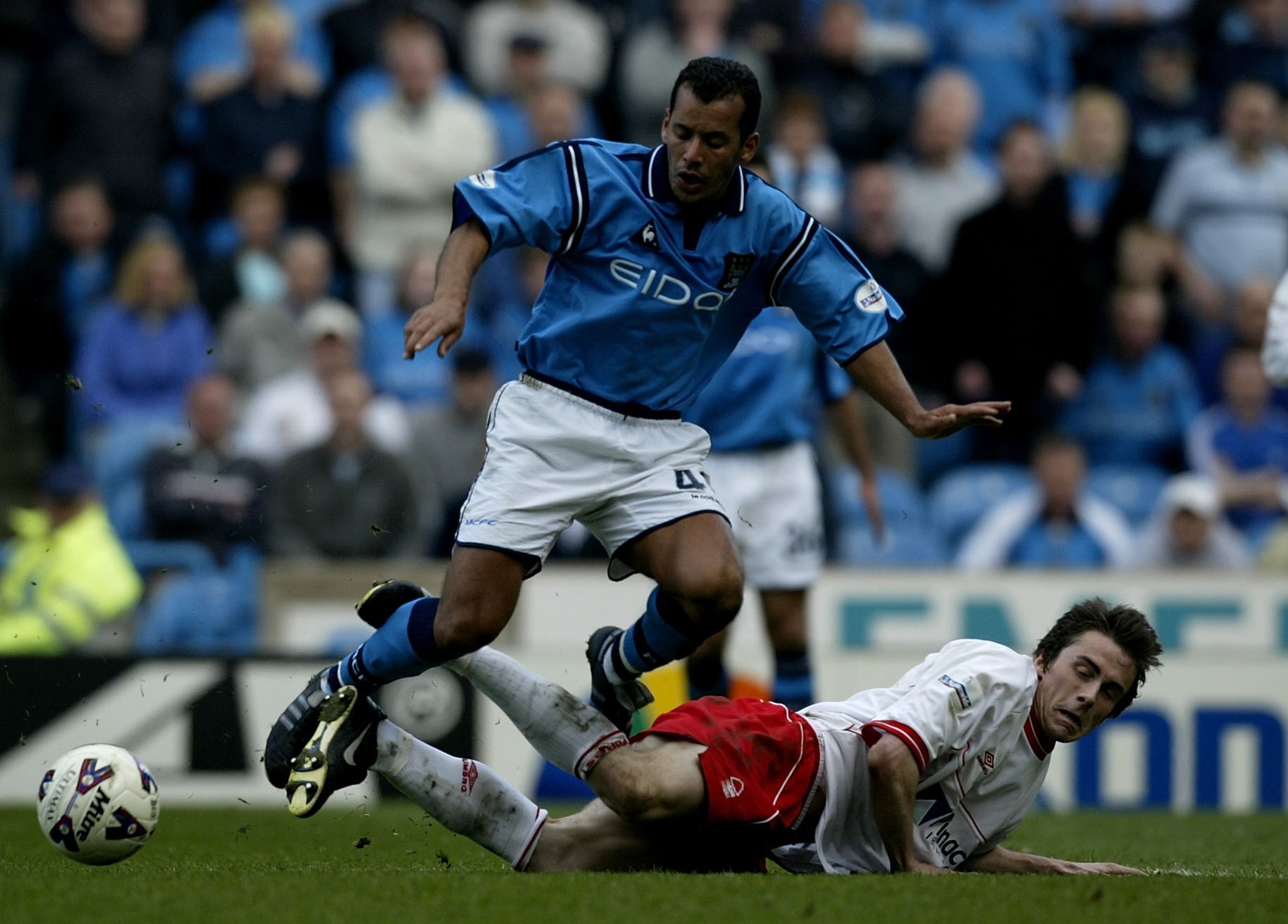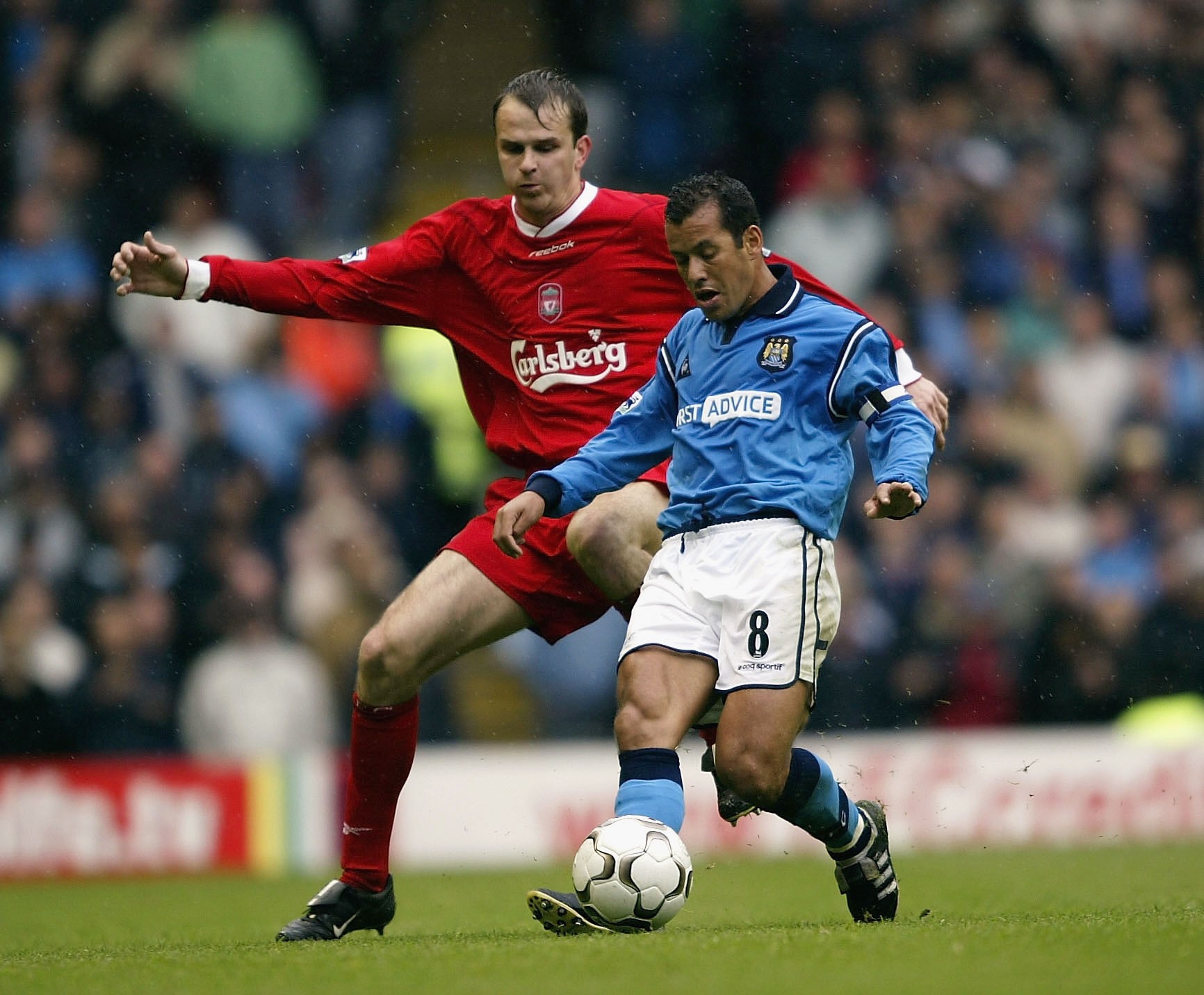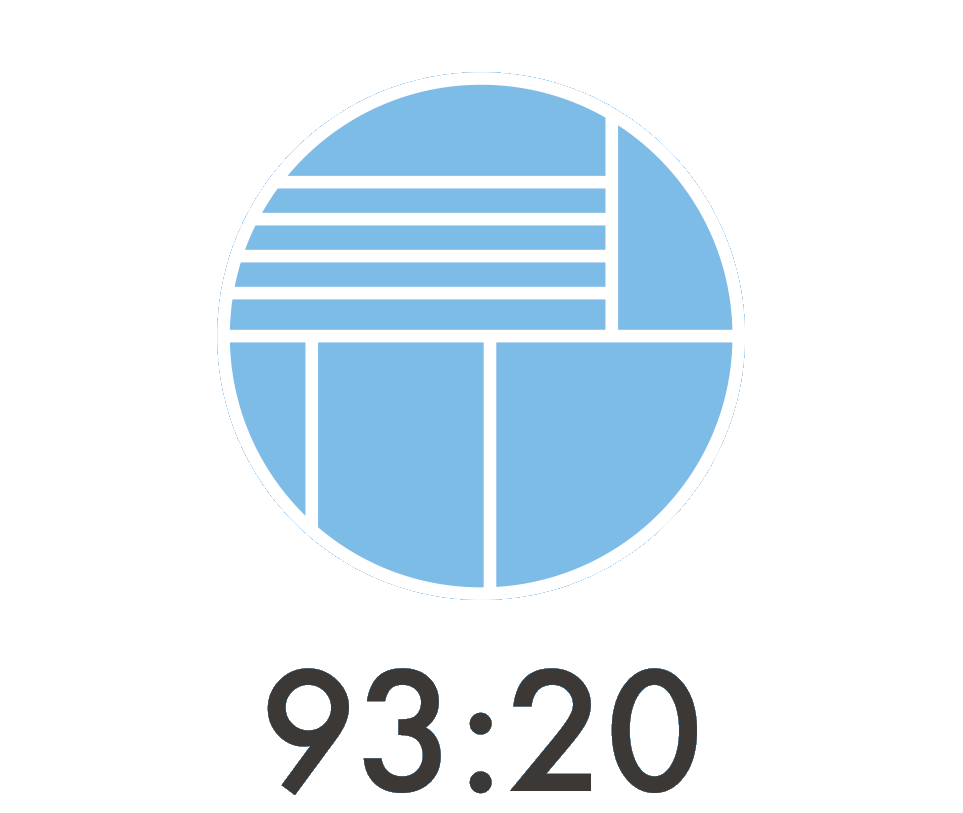Ali Benarbia: The Maestro Who Painted Pictures In His Brain
By Howard Hockin | 17 September 2019A look at one of City’s most popular players’ brief stay in Manchester.
(Photo by Alex Livesey/Getty Images)
What constitutes a legend? And how long does a player have to be at a club to be talked about in such terms? Because the question arises when I write about Ali Benarbia, a man who almost passed through Manchester City, but left plenty of memories in that short time. Some may consider the term legend too strong a description for someone who spent two seasons at a club, lighting up the place for just one of those two years. But this is still a player that left lasting impressions for all fans from that era. And hero worshipping players from the 1990’s and early years of the 21st century is nothing to be ashamed of, but proof that a player does not have to play at the highest level and hoover up trophies to gain the appreciation of the fans that they serve.
Born in Oran, Algeria, a port city in the north-west of the country, Ali Benarbia would move to France at the tender age of two, and it was there that most of his career would play out. A career that began at Martigues would see him remain there for a decade before moving on to Monaco and Bordeaux, winning two titles along the way and ending at PSG. Benarbia was a member of the Monaco team that knocked Manchester United out of the Champions League in 1998. And considering he was named the league’s Player Of The Year in 1999, it was quite the coup when he agreed to join City, in the First Division, just two years later, even though his time at PSG could not be considered a success, the £2m capture failing to score whilst there. For luring him to City we had Kevin Keegan to thank. Benarbia and his Monaco team had destroyed a Newcastle side in the UEFA Cup shortly after Keegan had departed from Tyneside. Keegan remembered, and promised City fans that they will not have seen many players of his ilk, commenting shortly after his signing, ‘They will come up with names like Colin Bell and he is definitely in that class.’ Keegan treated Benarbia to a salmon dinner to help seal the deal, and City had themselves a mercurial talent on a free transfer. Why he was available for nothing was linked at the time to a suspect temperament, having fallen out with managers in the past. This would not be a problem at City. Eyal Berkovic almost was though, the Israeli playmaker advising Keegan not to sign Benarbia. Thankfully his advice was ignored, and Berkovic later admitted how wrong he was. Keegan would later suggest that the reasons behind Berkovic’s doubts were rather straight-forward, in that he felt threatened by the new arrival.
But hang on, because it seems time has dulled Keegan’s memory. In his recent autobiography, “My Life In Football”, Keegan admits the signing was one of the luckiest in his career, as he had never heard of him until Ali’s agent, the one and only Willie McKay rang to say he was picking up the player at the airport before taking him to Sunderland. McKay wanted to stop off at City on the way, so he and Keegan had lunch. It was only when Keegan’s right-hand man Arthur Cox saw Benarbia at the ground that he reminded Keegan of Monaco’s destruction of Newcastle United all those years ago, and how Ali Benarbia was the best player on the pitch that day, a pitch on which the likes of Thierry Henry and Emmanuel Petit strutted their stuff. But Keegan noted in his autobiography that he did not watch a minute of Newcastle after leaving, so never saw the match. With Cox’s prompting he sought out Benarbia, who was already tucking into a salmon lunch. He saw the respect that other players were showing the Algerian. The Sunderland manager Peter Reid failed to show up to see his trial, Benarbia agreed to train with City, and the rest is history. And all thanks it seems to Arthur Cox, not Kevin Keegan.
Promotion Push
As fans we knew little of the player that City had signed either. This was 2001, when there weren’t online articles, YouTube compilations and scouting reports readily available for every footballer on the planet. Joe Royle had gone after relegation from the Premier League, and it was up to Kevin Keegan to return the good times to Maine Road. All we did now was that by the time of his arrival, Benarbia was closing in on his 33rd birthday. And this would be key to his time at City and evaluating his impact. But in training, Keegan was mesmerised by what he saw – an island of composure for whom giving away possession was a sin. A player who reminded him of Alan Ball, of all people.
He hit the ground running however, with City finding the net 15 times in his first four league games. Those with long memories will remember him coming pretty much straight off the plane to rip Birmingham City to shreds on his debut. To fly in and play to that level was amazing, especially for a debut game in a new country, a feat reminiscent of a year earlier, when Paolo Wanchope flew in from international duty to help deliver a shock win for City at Elland Road. An impact so immediate that after just 20 minutes he got a standing ovation from a section of the home crowd when he went to take a corner.
Benarbia set about settling in to his new surroundings. His family flew over, and he vowed to take English lessons three times a week. He turned down an invitation to watch United in the Champions League (wise move) from his friend Fabien Barthez (they played together at Monaco) to rest and prepare for a trip to Coventry, where he would score his debut goal for City. The highlights would continue for the remainder of a sparkling season, as the City fans instantly fell in love with their new signing. A perfectly-weighted through ball would see Danny Granville grab another equaliser in the same game at Highfield Road. Just a few days later two assists and another goal saw City run riot against Sheffield Wednesday. The rest of the season would follow a similar theme, a flicked back-heel assist for Shaun Goater at Gillingham living long in the memory. Alongside the equally talented Eyal Berkovic, the duo was just too good for the 2nd tier of English football. With Keegan’s penchant for attacking football, they had the time of their lives. 99 points, and 108 goals. Assisted by the likes of Shaun Wright Phillips, Darren Huckerby, Paolo Wanchope, Stuart Pearce, Shaun Goater, Richard Dunne and more, City were an unstoppable force. Benarbia even changed the way City played. Keegan wanted to experiment with Wright-Phillips at wing-back, and it was Benarbia’s assurances to Shaun that “I will not lose the ball” that allowed Wright-Phillips to bomb down the wing repeatedly, confident that the gap he left behind would not be exploited by the opposition. Because to do so, they’d have to dispossess Ali Benarbia. And that wasn’t happening.

(Photo by Alex Livesey/Getty Images)
A Fan Favourite
The destination of the title was rarely in doubt, as City finished well clear of West Brom. City were back in the Premier League at the first time of asking, Benarbia pocketing a nice £250,000 bonus in the process. And this time they would stay there for good. And by the end of the season, Keegan was already calling Benarbia the best player he had ever worked with. What’s more, signs of a suspect temperament were few and far between, apart from a red card for an elbow early on in a game against Millwall. City would still win 2-0 and miss a penalty. Even Joey Barton was complimentary about Ali in his autobiography, calling him a super bloke, both charming and engaging. But don’t assume Ali was at City to make friends, even if that is what happened. He said, ‘I’m only in football to win trophies. Second place is of no use at all to me and I expect every team-mate of mine to be the same.’ And that was the thing with Benarbia that separated him from most. As Nick Makin described on Twitter, ‘He had all the flair but also the passion, aggression and will to win to make him one of the best’. For Daniel Prins, the reasons were many: ‘He was at City when I started following them and just the way he moved on the pitch, his touch and the aura he had made me fall in love with football even more and in love with City’.
What those comments showed was the importance of the relationship Benarbia struck up with the fans. In 2013 Ali returned to Manchester to appear at City Square prior to a game against Arsenal. He spoke of his fond memories of his time at City, playing just hours after arriving and about the support of the fans: “To see 35,000 people, I said I am in the 2nd division? I think no, it is wrong.” City’s crowds often exceeded those Benarbia had played in front of in France’s top league, clearly something he had never expected. And nor had the fans expected a free transfer who had appeared seemingly from nowhere to have such a profound effect immediately on their team. It was a match made in heaven.
The Premier League
It was a great promotion season, but while Benarbia was too good for the Championship, it turned out he was a tad too old for the Premier League. His legs just couldn’t do what his brain knew they once could, and being awarded the captain’s armband for the season could not mask that. A beautiful consolation goal at home to Tottenham as Christmas approached was his debut goal in the division. He would score just two more that season. He would feature regularly with over 30 appearances and played his part in City preserving their Premier League status with ease, but never quite reached the heights of his debut season, the opposition naturally stronger and the end of his career quickly approaching. He still provided plenty of memories as City finished in the top half of the table. A role in a rare winner at Anfield, a delightful assist for Marc-Vivien Foé against Aston Villa and a great diving header in the same game.
And so after a summer to decide on his future, the pre-season friendly against Barcelona was the ending of an era, and the dawning of a new one. The first game at City’s new home, The City Of Manchester Stadium. And the last game for Ali Benarbia, who announced his retirement pre-game. Baby in one hand, presentation shield in another, this would be City fans’ last chance to see him turn out in blue on a warm August day. His time at City was up, all too brief but full of memorable moments. After playing a half at Mansfield in a friendly, he made his decision, and Kevin Keegan and the board agreed to pay him the remaining year on his contract, lead out the team at the new stadium and play a final half an hour. Keegan suggested at the time that the request from Ali to retire had come as a shock, but that the Algerian may have been affected by the death that summer of Marc-Vivien Foé, making him look at the world in a different way now. With Eyal Berkovic spitting his dummy out and requesting a move away, having definitely not been tapped up by Harry Redknapp at Portsmouth, it would be a brave new world for City’s midfield, the creativity ripped out of its heart. The arrival of Antoine Sibierski, Paul Bosvelt, Steve McManaman and Claudio Reyna hardly solved that particular problem. A couple of those arrivals showed the penchant from City for taking on players after they were past their best – thankfully Ali was different. But with him gone, the captain’s armband would be passed on to Sylvain Distin for the following season.
At the time, Benarbia gave his reasons for calling it a day. ‘This is a decision I have thought about very carefully. My aim when I joined City was always to help the team gain promotion, and then to become established in the Premiership. I believe that we have done this, particularly after our ninth placed finish last season. I also wanted to finish my career on a high, knowing that I have played my best and done justice to myself and the team. My concern is that I would be unable to sustain the level required for another season in the Premiership. I cannot think of a better club at which to finish my competitive career, and my thanks go out to the Manchester City fans, who quite honestly have been the most amazing I have ever played for. I would also like to say a big thank you to Kevin Keegan and the team for all their support and everything they have done for me. I wish them all the luck in the coming season.’
Five days later, he came out of retirement and signed for Al-Rayyan in Qatar. He would remain in the middle east for three years before retiring for good.
As for his international career, the highlights were few and far between. Benarbia had been approached by the Algerian Football Association as early as 1986, but would not appear for his country until 2000. At a time of great political upheaval in his country of birth, including a civil war, he was unwilling to represent Algeria unless the safety of the players could be fully guaranteed. Eventually he would play for Algeria 7 times towards the end of his career.
And like the mercurial Georgi Kinkladze before him, a look back at Benarbia’s time at City would not be complete without the question of “what if?”. With Kinkladze, the question related to whether his talents could have been put to better use. With Benarbia, the question relates to the regret that he hadn’t joined City earlier. What more joy could we have taken from watching him if he had been at the club during his prime? There was never a realistic chance of that however, City at their lowest ebb when Ali was at his peak, and perhaps we should just be grateful we got to see him at all. Both Kinkladze and Benarbia would only spend a single season in the Premier League with City, which must temper how we react to their time. Maybe it doesn’t and shouldn’t matter, and we should just enjoy footballers like them. Because players like that are what excite fans more than any other. An innate control of a football and magic in their boots that we almost take for granted nowadays. For whilst it may have been in the 2nd tier of English football, the promotion season under Keegan, breaking goal scoring and points records with aplomb, remains one of my favourites as a fan of 40 years. A season that took City out of the doldrums and restored pride and a level of football we had rarely seen. Ali Benarbia was a key component in all of that, and unlike Kinkladze part of a team on the up. One of the few players from the past that probably could play in the current side. A player who Keegan said could paint pictures in his brain.
A player for all the ages.

(Photo by Clive Brunskill/Getty Images)
